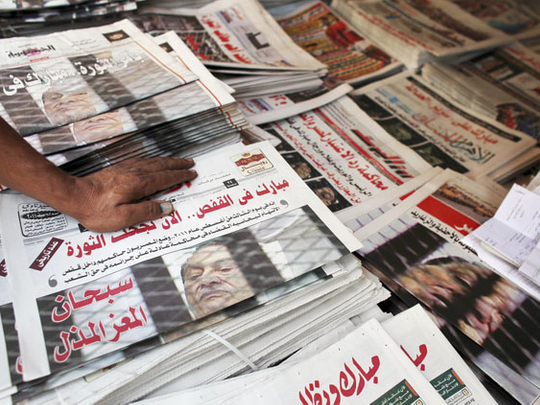
Dubai: A recent poll concluded that 67 per cent of Egyptians support the idea of executing their former president Hosni Mubarak if he is found guilty.
However, Egyptian political experts doubt such a result. They say that the first session of the trial has "greatly succeeded" in absorbing the anger of the masses at the man who ruled them for 30 years and blamed his corrupt regime for their suffering and poor living conditions.
"I can't judge before I see the methodology of the poll," Jamal Abdul Jawad, director of the prominent Cairo-based Al Ahram Strategic Studies Centre, told Gulf News in reference to the recent YouGov survey.
"But [my] general impression is that the percentage is far much higher than what I notice."
According to the results of the survey, which was posted on the pan-Arab Al Arabiya's website, 67 per cent of Egyptians want the death penalty for Mubarak if he is found guilty of committing "several crimes against the people". Only 22 per cent oppose his execution.
The sample of the survey included 1,012 Egyptians and was conducted between August 5 and 7.
Nearly 77 per cent of those surveyed in the 18-24 age group support Mubarak's execution. However, the percentage decreases among the older.
Corruption
While nearly 48 per cent of those surveyed believe being a "dictator" is the most distinguished feature of the deposed leader, 46 per cent said the most notable characteristic was his "corruption".
Abdul Jawad agrees that the youth group has "a more radical and restrictive" position, especially given that it was the largest group involved in the January 25 revolution.
"This [youth opinion] is understood and justified. But on the other hand, other polls we have conducted repeatedly showed that the youth have two contradicting views [towards Mubarak], though their general feelings are radical," he noted.
Mubarak appeared in a courtroom on August 3, his first public appearance since he was deposed in February. He denied the charges.
Mubarak, along with two of his sons and other senior officials, has been charged with corruption and ordering the killing of over 800 protesters during the revolution.
The first session of the trial, which was broadcast live on state TV, was marred by stone-throwing incidents and clashes between Mubarak's supporters and opponents outside the Police Academy, where the trial took place.
"I think the first session has greatly succeeded in absorbing the growing frustration among the Egyptians. It ended a division about the trial itself. It boosted confidence in the Military Council and the ruling institutions in society. It calmed the situation," Abdul Jawad said of the trial which has been adjourned till August 15.
Egyptians following the first session of the trial have mixed feelings of both relief and sorrow, he noted.
A sense of relief was created because the trial ended any division about whether to put Mubarak on trial or not. But the sight of the 83-year-old president lying on a bed behind bars didn't generate joy.
While many political analysts feel the great focus on Mubarak's trial will slightly decline with time, they add that the centre of attention on him will increase and decrease according to the "drama" accompanying the court sessions.












